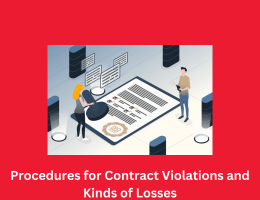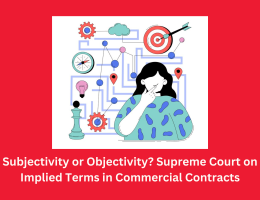
Contractual Capacity: A Comprehensive Analysis
- By admin --
- Thursday, 07 Mar, 2024
Introduction:
The idea of contractual ability is crucial to the legitimacy and enforcement of agreements among parties inside the subject of agreement regulation. The felony competence or potential of human beings or entities to enter into legally binding contracts is referred to as contractual capability. It is imperative for events to understand the conditions and constraints referring to contractual capability with a purpose to proficiently manipulate their contractual connections and guarantee adherence to criminal standards. This speak delves into the idea of contractual capacity, analyzing the prison capability needed through people, organizations, and mentally incompetent people to enter into contracts. It also clarifies the nuances surrounding capability in the felony machine.
Minors:
The concept that humans below the age of majority do no longer have the entire prison capacity to engage into legally binding contracts is one of the core tenets of settlement regulation. Minors' contracts are typically voidable at their discretion considering it is believed that they lack the maturity and judgment required to fully appreciate the repercussions in their actions. There are, however, some exceptions to this rule, and relying on the state of affairs, a few agreements made by minors might be upheld.
Contracts for Necessaries:
Notwithstanding the overall rule that minors lack the prison capacity to enter into contracts, there may be one exception: contracts for requirements, or products and services essential for the minor's preservation and properly-being. Since contracts for necessities are vital for minors' welfare, protection, and health, they're appeared as legally binding on them. Among the things that fall underneath this class are food, apparel, housing, healthcare, and education. However, the extent of what qualifies as required can change based totally at the occasions surrounding the minor and the frequent social norms.
Ratification:
The idea of ratification affords another exception to the general rule that minors lack contractual ability. Once a minor reaches the age of majority, they may be able to decide whether or not or no longer to affirm a agreement they made even as still a minor. When a minor affirms the terms of a contract and has the same opinion to be sure by its responsibilities, either explicitly or implicitly, the agreement is deemed ratified. The settlement is enforceable against the minor and becomes legally binding as quickly as it's far ratified, just like if it were signed while the minor became an person.
Mentally Incapacitated Individuals:
People who are mentally incapacitated might not best be minors however also lack the necessary contractual competence to signal legally enforceable agreements. A circumstance known as mental disability impacts someone's capacity to understand the nature and ramifications of their moves or to properly explain their dreams. Mental ailment, highbrow incapacity, and cognitive impairments are some of the causes of mental incapacity.
Contracts signed by way of people who are mentally sick are normally seemed as voidable due to the fact those humans might not be able to recognize the contents of the settlement or make smart decisions. Like with minors, there are, but, some exceptions to this norm, and in a few situations, contracts is probably upheld towards folks that are mentally incompetent.
Capacity to Understand:
For people who are mentally incapacitated, the capability to realize the nature and implications of a transaction at the time the settlement is formed is a important component in figuring out their contractual capacity. The contract may be voidable on the discretion of the events if one of them is incapable of comprehending the terms of the settlement or appreciating its implications. Nonetheless, the contract may be enforceable if the celebration has the mental potential to recognize the deal and come to a rational end.
Guardianship and Legal Representation:
When someone is said mentally incompetent, guardianship or legal counsel can be assigned to defend their rights and deal with their affairs. If it is of their pleasant pastimes and in the bounds of their felony authority, guardians or legal representatives may be capable of signal contracts on behalf of the incapacitated individual. Subject to the best rules and guidelines regulating guardianship and criminal illustration, contracts positioned into on behalf of mentally disabled individuals by guardians or legal representatives are usually binding.
Corporations:
In contrast to people, businesses are seen as artificial legal beings having exclusive legal personalities from their officers, administrators, and stockholders. Legally speakme, corporations are able to sign contracts and do business on their personal. However, a organisation's articles of incorporation, bylaws, or other applicable laws and guidelines may also vicinity regulations at the potential of the business enterprise to have interaction into contracts.
Ultra Vires Acts:
The notion of ultra vires, which forbids organizations from appearing or stepping into contracts outdoor the limits in their permitted company functions, is one restriction on a organisation's contractual competence. Beyond the company powers, or extremely vires, acts are deemed void and unenforceable on the grounds that they're no longer sanctioned with the aid of the business enterprise's bylaws or different prison authorities. When a business violates its legal barriers by using ultra vires actions, its officials, administrators, and shareholders ought to face non-public legal responsibility.
Conclusion:
In precis, contractual ability is a key idea in contract regulation that controls a celebration's ability to legally enter into legally binding agreements. With a few restrictions and exceptions, it's miles typically widespread that individuals who are mentally sick or minors do now not own the total ability to interact into contracts. Contrarily, corporations have the prison ability to interact into contracts, however this potential is restricted by way of their corporate shape and prison authority. Parties can control their contractual interactions skillfully and assure felony principles are accompanied by means of knowing the conditions and restrictions surrounding contractual functionality.





